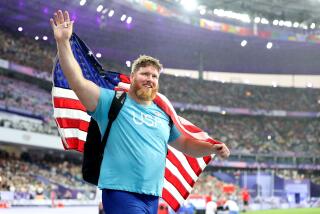Truly Great Brit, Torrid Torrence : Track and field: Edwards surpasses 60-foot barrier in world-record triple jumps, American sprint champion doesn’t mince words.
- Share via
GOTEBORG, Sweden — Jonathan Edwards’ historic performance so uplifted not only the crowd at Ullevi Stadium, but also his competitors, that it was virtually a religious experience. But Gwen Torrence’s victory was met with an entirely opposite reaction as the third day of track and field’s World Championships offered the best and worst of the competitive experience.
Gold medals for Torrence in the women’s 100 meters and Dan O’Brien in the decathlon Monday improved the United States’ total to three, helping salve the wounds inflicted by the withdrawals of perennial champions Jackie Joyner-Kersee and Carl Lewis.
Of course, even in the worst of times, the Americans could expect no sympathy from the British, who lost reigning hurdles champions Colin Jackson and Sally Gunnell because of injuries before the meet and star sprinter Linford Christie because of a strained hamstring in Sunday’s 100-meter final.
In light of that, it was easy to understand when the Brits surrendered to hyperbole, using terms like “Beamonesque,” to describe the efforts of their latest hero, the Bible-toting, Scripture-quoting Edwards, in the triple jump.
A man better known for his refusal until two years ago to compete on Sundays than for his hop, step and jump prowess, the 29-year-old medical researcher and Baptist minister-to-be was amazing, crashing through the 60-foot barrier on his second jump. For non-American readers, the significant barrier was the 18-meter one that he broke on his first jump.
When the day began, Edwards held the record of 59 feet. At the end of the day, the record had been extended by more than a foot to 60 feet 0 1/4 inches. In between, he jumped 59-7.
He said that he was overwhelmed but hoped that the feeling would not extend beyond the triple jump pit.
“I think I need a lot of wisdom,” a humbled Edwards said afterward of his elevation to Sebastian Coe status in British track and field. “There’s a lot of temptations and snares that well could lead me off the track. Ultimately, I want to glorify God and be a good husband and father.”
While Edwards was speaking to reporters, the man who was supposed to make history here, O’Brien, was again among the stragglers in the last of 10 events, the 1,500 meters, as still another of his decathlon victories came to an anti-climactic conclusion.
It is difficult to criticize O’Brien because this was his third consecutive world championship in the most demanding of disciplines, one that he won by a solid 116 points over Belarus’ Eduard Hamalainen. But O’Brien set himself up by promising that he was in shape for an assault on his 1992 world record of 8,891, and perhaps even 9,000, points. Instead, O’Brien complained about the schedule, the swirling winds and sore knees as he finished at 8,695.
“I’m not happy with my score,” he said. “I could have had 300 more points.”
Torrence was ecstatic after adding the 100 title to the one she won in the Olympics three years ago in the 200.
After she, Jamaica’s Merlene Ottey and Russia’s Irina Privalova produced the three fastest times in the world this year in the semifinals by running 10.84, 10.85 and 10.90 seconds, respectively, they returned for a replay in the final. The order of finish was the same, but Torrence’s 10.85 beat the rest by almost a tenth of a second. Ottey was second in 10.94, Privalova third in 10.96.
Afterward, only Ottey among the other seven finalists congratulated Torrence for her virtual wire-to-wire victory. It was not because the others could not catch up with her.
“She’s a good athlete; you’ve got to give that to her,” said Jamaica’s Juliet Cuthbert, who finished eighth in 11.44. “But I don’t think anybody wanted her to win. I don’t think anybody likes her.”
A Jamaican official, Herb Elliott, explained that the other sprinters are still smarting because of Torrence’s unfounded accusations during the 1992 Barcelona Games that some of them are drug-users. She since has repeated that, including Monday on Swedish television.
“My mother always taught me to speak my mind, growing up poor in Atlanta,” Torrence, 30, said after her race. “But I’ve got to be a little more in control of myself and my feelings.”
She then demonstrated that it will be a challenge for her, calling Cuthbert “a loser.”
Asked about her competitors’ indifference to her victory, Torrence said: “I love it.”
Edwards’ victory, in contrast, truly was popular among the triple jumpers. Not only does he have their admiration after overcoming the strength- and stamina-sapping Epstein-Barr virus to have the greatest year of his, or any triple jumper’s, life, he also is an extremely gracious man.
For example, the first thing he did after setting the first of his two world records Monday was approach the next jumper, Bermuda’s Brian Wellman, and apologize for all the commotion he had caused among the photographers.
Wellman eventually finished second at 57-9 3/4, followed by Dominica’s Jerome Romain at 57-8 1/2. Both are NCAA champions from Arkansas, where they are coached by the 1993 world champion, Mike Conley. Competing here, he finished seventh at 55-7 3/4.
Conley embraced his students, then sent them off on a victory lap with Edwards.
That would be the extent of Edwards’ celebration. He said he planned to return to the athletes’ village, take a shower, call his wife, Allison, in Newcastle and perhaps play a little chess.
More to Read
Go beyond the scoreboard
Get the latest on L.A.'s teams in the daily Sports Report newsletter.
You may occasionally receive promotional content from the Los Angeles Times.






